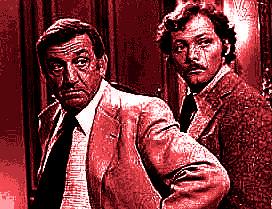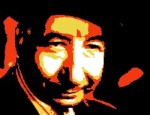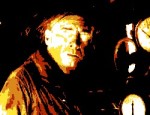Film Review
With its lively action scenes, gripping story and impressive cast,
which is headed by two of the great icons of French cinema, it is easy to see
why
Adieu, poulet is still regarded as
one of the best French policiers of the 1970s. Strongly
influenced by American thrillers of the time - for example, the
Dirty
Harry films - the French polar had by this time gained
far more gritty realism than in previous decades, which meant there
was much more in the way of physical violence and more direct allusions to
contemporary worries about police corruption and underhand political involvement in the judicial
system. The film's account of a seemingly incorruptible maverick cop
battling against his superiors, all of whom are implicated in some nasty
political intrigue, somewhat resembles that of the second
Dirty Harry film,
Magnum
Force (1973), with Lino Ventura proving that he
is more than up to the job of filling Clint Eastwood's shoes, as and when required.
This is arguably Ventura's finest hour as the no-nonsense tough guy,
the role with which he is most closely associated and in which he
excels. His is hardly a sympathetic portrayal - in one scene he
is seen effortlessly turfing a group of Hare Krishnas into the street
as though they were sacks of rubbish - and yet he exudes such moral
authority that he completely monopolises our sympathy. Whilst
everything around him appears to be tainted with corruption, Ventura
triumphantly emerges, in
Dirty Harry
fashion, as society's avenging angel. And what an inspired piece
of casting to partner him with Patrick Dewaere, a rising young star who
would become renowned for playing livewire rebels and misfits with a
manic intensity. Despite their very different acting styles,
Ventura and Dewaere are two of a kind - charismatic, dangerous and
unpredictable - you just cannot imagine a more perfect match of
contrasting personalities in a French crime thriller. With
such a dynamic duo blazing across the screen, it is all too easy to
overlook the film's extraordinary ensemble of supporting players -
Claude Rich, Victor Lanoux and Julien Guiomar - all supremely
convincing as the three prime villains of the piece.
Given how slick and well-constructed
Adieu,
poulet is, it is surprising to learn that it was directed not by
an habitué of the cold dark world of the polar (Jacques Deray,
Georges Lautner, Henri Verneuil, etc.) but instead by Pierre
Granier-Deferre, a filmmaker who had very limited experience of the
genre. Granier-Deferre had made one notable thriller before this
-
La
Horse (1970) - but this was more a psychological drama in
the French tradition rather than the full-bodied American-style police
procedural that
Adieu, poulet
assuredly is. Just as surprising is the fact that the taut and
fast-moving screenplay was written by Francis Veber, who is
renowned not for tough thrillers but outlandish comedies, such as
La
Chèvre (1981) and
Le
Dîner de cons (1998).
What is most striking about Granier-Deferre's oeuvre is its diversity -
his films range from the oddball comedy thriller
La Métamorphose des cloportes
(1965) to cruel character studies such as
Le Chat
(1971). Granier-Deferre was a contemporary of the New Wave directors
(Godard, Truffaut, etc.) but represented a continuation of the quality
tradition, eager to build on what had gone before rather than rip up
the floorboards and start afresh. Many of his films were every
bit as stylish, provocative and idiosyncratic as anything coming out of
the Nouvelle Vague, but generally had far greater mainstream appeal,
partly because he could attract the biggest stars in French cinema
(Alain Delon, Jean Gabin, Simone Signoret, to name just three).
Whilst some of Granier-Deferre's films can easily be written off as being
too conservative, some, such as
La Cage (1975) and
Une étrange affaire
(1981), are daringly innovative.
Adieu, poulet illustrates
Granier-Deferre at his artistic and technical best - a hard-edged
thriller
à l'américain
which was so popular that it helped to establish a new sub-genre in
French cinema, the neo-polar - France's version of the conspiracy
thriller which expressed growing public concern over widespread
corruption in high places. Patrick Dewaere would star in one of
the most successful and chilling examples of the genre, Yves Boisset's
Le
Juge Fayard dit Le Shériff (1977).
© James Travers 2011
The above content is owned by frenchfilms.org and must not be copied.


